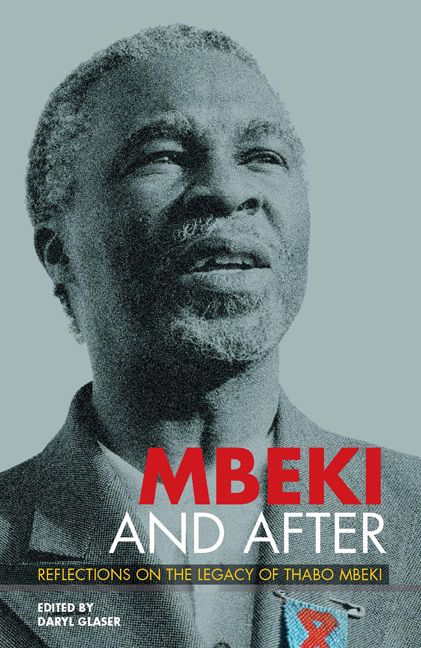Book contents
- Frontmatter
- Contents
- Acknowledgements
- Acronyms
- General Reflections
- 1 Mbeki and his legacy: A critical introduction
- 2 Mbeki's legacy: Some conceptual markers
- 3 Why is thabo mbeki a ‘nitemare’?
- The Mbeki Style Of Governance
- Mbeki And Society
- Mbeki And Race
- Mbeki Abroad
- Notes
- Contributors
- Bibliography
- Index
1 - Mbeki and his legacy: A critical introduction
from General Reflections
Published online by Cambridge University Press: 21 April 2018
- Frontmatter
- Contents
- Acknowledgements
- Acronyms
- General Reflections
- 1 Mbeki and his legacy: A critical introduction
- 2 Mbeki's legacy: Some conceptual markers
- 3 Why is thabo mbeki a ‘nitemare’?
- The Mbeki Style Of Governance
- Mbeki And Society
- Mbeki And Race
- Mbeki Abroad
- Notes
- Contributors
- Bibliography
- Index
Summary
Is there an Mbeki legacy? Looking back at Thabo Mbeki's presidency from a vantage point of mid-2010 an observer might easily conclude that that legacy – such as it is – consists in three classes of phenomena: mayhem caused and now needing to be repaired (policies on AIDS and Zimbabwe), batons merely passed from Mbeki's predecessor to his successor (a functioning democracy and mixed economy) and seemingly equal-and-opposite reactions elicited among the former president's many enemies (the internal ANC rebellion against Mbeki and subsequent efforts by the victorious rebels to establish a ‘not Thabo Mbeki’ style of governance). It is the third class – the reactions elicited – that will seem to many the most important for understanding South African governance now, and therefore to constitute Mbeki's most palpable legacy.
This being so, why should there be a book, now, about Thabo Mbeki and his legacy? For one thing, public interest in Mbeki remains surprisingly strong – as evidenced, for example, by advance sales for books about the former president. The interest is partly (still) in the man, even as he sulks in retirement. Biographers, columnists and political scientists have felt compelled to retool as amateur psycho logists the better to understand the former president's psychic com plexity. And Mbeki's was a consequential complexity: his sensitivity to racial slight directly influenced government approaches to the AIDS pandemic and the crisis in Zimbabwe; feelings of insecurity and even paranoia arguably lay behind the former president's efforts to run his political rivals out of town; Mbeki's contempt for those he considered of lesser ability than himself doubtless fuelled his search for centralised command and control, his secrecy, and his stubborn refusal of unsolicited advice (Gumede 2005: 163-4, 179-82; Gevisser 2007: 230-5, 284, 440-43, 740, 793; Johnson 2009: 178-221, 233-38, 340-67).
Just as ‘interestingly’, Mbeki seemed to be more than one man: charmer of whites and race-baiter, technocrat and nationalist romantic, free-market convert and developmental-statist, globaliser and Third- Worldist, champion of the black bourgeoisie and bearer-of-warnings about society's descent into crass materialism. What made the man tick? What else but fascination with this question could explain the turnout of well over a thousand people to the launch of Mark Gevisser's biography of Mbeki, even as the president's powers were waning?
Information
- Type
- Chapter
- Information
- Mbeki and AfterReflections On The Legacy Of Thabo Mbeki, pp. 3 - 40Publisher: Wits University PressPrint publication year: 2009
